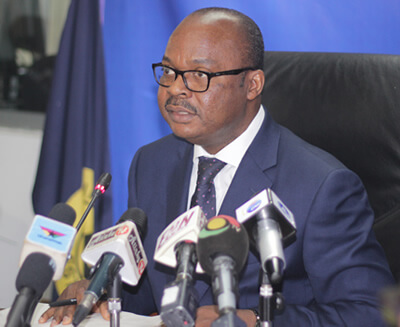Addressing the 95th Monetary Policy Committee press conference on Monday, July 27, 2020, Governor of the Central Bank, Dr Ernest Addison says the Monetary Policy Committee decided to maintain the policy rate at 14.5 percent citing the need for macro-economic stability despite a slowdown brought on by the coronavirus pandemic.
Extraordinary Circumstances
“The Committee was of the view that the current extraordinary circumstances, with a widened budget deficit and a residual financing gap, would require some monetary restraint to preserve the anchors of macroeconomic stability. In the circumstances, the Committee decided to maintain the policy rate at 14.5 %,” he said.
It would be recalled that in March, the Monetary Policy Committee lowered the policy rate by 150 basis points from 16 percent to 14.5 percent. He said the Coronavirus had “significantly heightened uncertainty in global financial markets, causing a sharp downturn of global stock prices and a steep rise in emerging markets’ sovereign bond spreads. These unfolding developments have further worsened the pre-existing weaknesses in global growth and caused major disruptions to global supply chains with adverse implications for the global economy.”
ALSO READ: Bank of Ghana cuts policy rate to 14.5%; eases limits on Banks to aid liquidity
Increased Uncertainties
Addressing the Committee on Monday, Dr Ernest Addison indicated that “uncertainties in the global economy have increased, although investor uneasiness improved somewhat. The uncertainty derives from a possibility of a prolonged downturn as countries begin to experience a second wave of COVID-19 infections.
Consequently, the fiscal and monetary stimulus packages will have to be continued over a much longer horizon, which could lead to a negative spill over to emerging and frontier markets with consequences for weaker growth and instability. The spill-over of weak global demand conditions on the domestic economy will negatively impact exports, foreign direct investments, remittance flows, and domestic growth conditions.”
He further added that “Policy and regulatory measures announced by the MPC in March and May have positioned the banking sector to withstand the shocks associated with the pandemic and to support businesses.
These measures are working their way through the economy, and are beginning to impact positively. So far, new advances for the first half of 2020 was estimated at GH¢15.8 billion compared to GH¢12.1 billion the same period of last year. The central bank will continue to engage the banking industry to provide the necessary support in these challenging times.”
Expansive Monetary Policy
The Central Bank therefore lowered and decided to maintain the policy rate at 14.5% to perform an expansive monetary policy. Meaning, Bank of Ghana is trying boost economic activity by making it cheaper to borrow and provide more spending power for Ghanaians in this troubled time – the era of COVID-19.
Moreover, businesses/firms can borrow money more cheaply and use such funds to expand their businesses, while boosting the overall economy.
With respect to inflation, Dr Addison said inflation which stands at “11.2 percent was currently above its upper limit, driven mostly by food prices.” He however, “projects a return of inflation to the medium-term target band by the second quarter of 2021, conditional on corrective fiscal measures being introduced in the near-term,”




